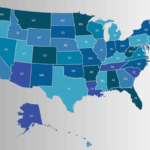Travel nursing offers flexibility, adventure, and strong pay. But let’s be honest — for many nurses, the paycheck is a top motivator.
If you’ve wondered, “How much do travel nurses actually make in 2025?” here’s a look at the latest data.
What Is a Travel Nurse Salary?
-
In 2025, travel nurses earn an average of $2,100–$2,400 per week.
-
That equals about $110,000–$125,000 per year before taxes, assuming year-round work.
-
Experienced nurses in crisis or hard-to-fill assignments can earn $150,000–$180,000+ annually.
What’s Included in a Travel Nurse Pay Package?
Travel nurses don’t just get hourly pay. Total compensation usually includes:
-
Tax-free housing stipend ($700–$3,000 per month, depending on location)
-
Meals and incidentals stipend ($250–$400 per week on average)
-
Completion or sign-on bonuses (often $500–$2,000)
-
Travel reimbursements for getting to your assignment
Knowing what’s taxable vs. non-taxable is key to understanding your real take-home pay.
Tip: Rural areas often offer crisis pay due to staffing shortages, even if the state average is lower.
Pay by State in 2025
States with high demand and higher living costs usually pay the most. Here’s what current job listings show:
| State | Average Weekly Pay | Common Assignments |
|---|---|---|
| California | Up to $3,600 | ICU, L&D, ER |
| Washington | $2,700–$3,500 | Telemetry, OR, Stepdown |
| New York | $2,600–$3,400 | Med-Surg, ICU |
| Texas | $2,200–$3,000 | ER, Med-Surg, OR |
| North Carolina | $2,100–$2,700 | ICU, PACU, Stepdown |
Rural hospitals sometimes pay above average to fill urgent staffing needs.
Pay by Specialty
Some specialties consistently pay more due to demand and skill requirements. Broad trends show:
-
ICU and Critical Care: top paying, often over $3,000/week
-
Labor & Delivery: competitive, often above $2,800/week
-
OR (Operating Room): consistently high demand
-
ER: strong rates, but high stress
-
Med-Surg and Telemetry: more common, generally lower than ICU or L&D
Exact numbers vary week to week. Specialty certifications (like CCRN or CNOR) can make you more competitive, but there’s no fixed dollar amount guaranteed.
Tip: Many travel nurses choose the stipend and find their own short-term rentals or extended-stay options to pocket the difference.
Housing: Stipend or Agency Placement?
Travel nurses usually choose between:
-
Agency housing — move-in ready, but less flexible.
-
Housing stipend — tax-free cash, usually $700–$3,000/month, depending on the city.
Many nurses pick the stipend and rent short-term housing to keep any leftover money.
Factors That Affect Pay
Your paycheck can rise or fall based on:
-
Location (urban vs. rural, high-cost vs. low-cost)
-
Experience (more years = higher offers)
-
Shifts (nights and weekends often pay more)
-
Crisis or rapid-response assignments (short, premium pay)
-
Compact license (faster onboarding = more opportunities)
Do Travel Nurses Really Make More Than Staff RNs?
Yes. On average, travel nurses earn more than staff RNs because of stipends, flexibility, and demand. Exact comparisons vary by hospital and location, but travel roles usually outpace staff roles by a significant margin.
Can You Negotiate Travel Nurse Pay?
Yes. Recruiters expect it. Experienced travel nurses often negotiate:
-
Higher weekly pay
-
Larger housing stipends
-
Bonuses or paid travel
Tip: Work with 2–3 recruiters to compare packages and get leverage.
Understanding pay is important, but it’s only one part of how to become a travel nurse. Our step-by-step guide covers licensing, experience, and landing your first contract.
Bottom Line
In 2025, most travel nurses earn $110K–$125K annually, with top contracts paying much more. Your exact pay depends on where you work, your specialty, and how you negotiate your package.
The key is to look beyond the hourly rate. Housing, stipends, and bonuses make a huge impact on your real earnings.





